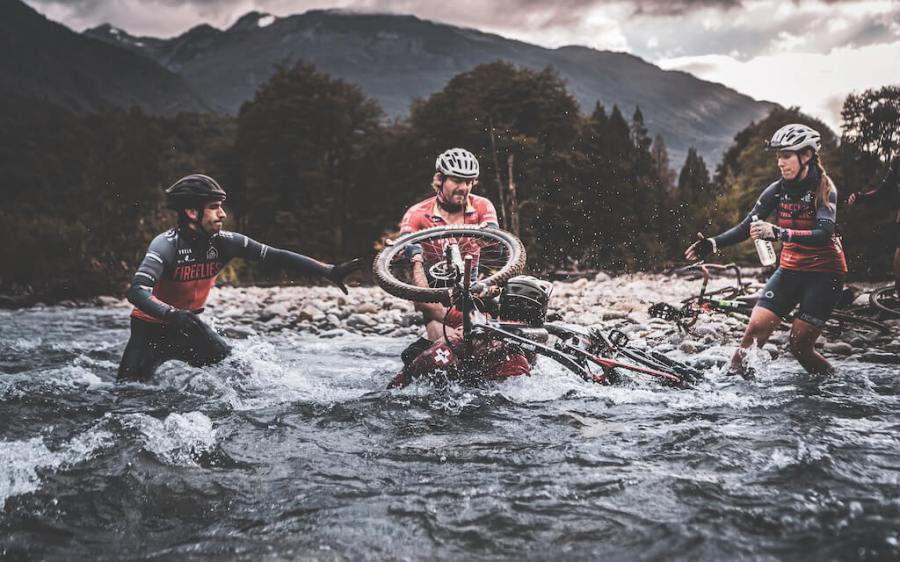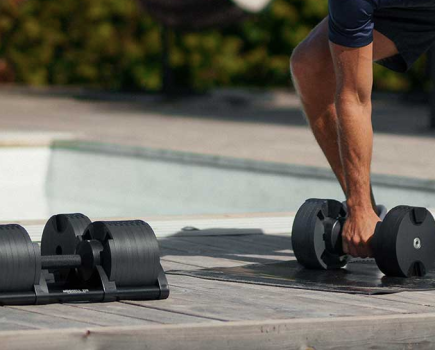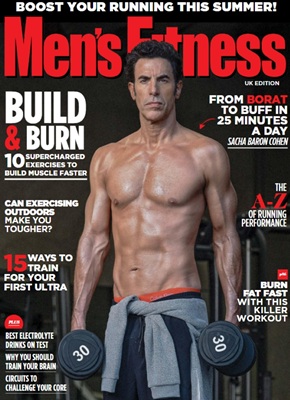The turbulence slams me against the roof of the fuselage. Our 12-seater plane bristles over a glacier. Cardboard bike boxes skate around back towards the rudder. Everyone turns a bit green and looks towards the cockpit.
“I told you to keep your seat belts on señores,” the pilot grins.
I buckle up and pop my cycling helmet on for good measure. Sheets of ice and rock, gaping couloirs and never-before visited forests are just inches from the groaning propellers. With a yank of the joystick, we pitch into a valley, losing height, dropping beneath the treeline until we are threading the plane through a mountainous slot you wouldn’t even take a chance on with a boomerang.
I’ve come to ride FireFlies Patagonia. It’s a 1,000km, ten-day cycling challenge through a part of the world where you’re more likely to see a brontosaurus than a bike repair shop. Bicycles of sorts have been with us for over 200 years now, but no one has ever ridden the majority of these trails.
Tomorrow we’ll begin pedalling alone through the Cochamó commune of northern Patagonia: three times as large as the Peak District, with a tenth of the people. There are virgin forests, unclimbed peaks draped with glaciers, roaming pumas, condors with three-metre wing spans, and the deep-blue Puelo river charging right through the heart of it all.
The pilot puts us down on a ribbon of tarmac in the wilderness. ‘Llanada Grande’, the locals call it. Before the propellers stop whirring, we are into a 4×4, headed to Puelo Libre lodge. A dozen riders on a terrace are fettling bicycles, lubricating themselves with beer and shouting over the great turquoise rush of the Río Puelo beneath their feet. The beer is reassuring. So too is the lack of shaved legs. But these are clearly cyclists who know their cake-breaks from their chain sets.
There’s the ex-cyclocross national champion turned FireFlies mechanic Carbono, earning his superlight nickname from years of semi-professional riding and bouncing enthusiasm. There’s Leo and Rodrigo from Santiago, used to training on paved roads leading to the city’s 3,000m-elevation ski resorts. There’s Axel, the Patagonian ‘local’ who lives only a day’s drive away. And there’s a contingent of strong women: Dani, Ignacia, Carola and Lula. All of their bikes have serious dents in the paintwork: signs of pushing their machines to the limit.
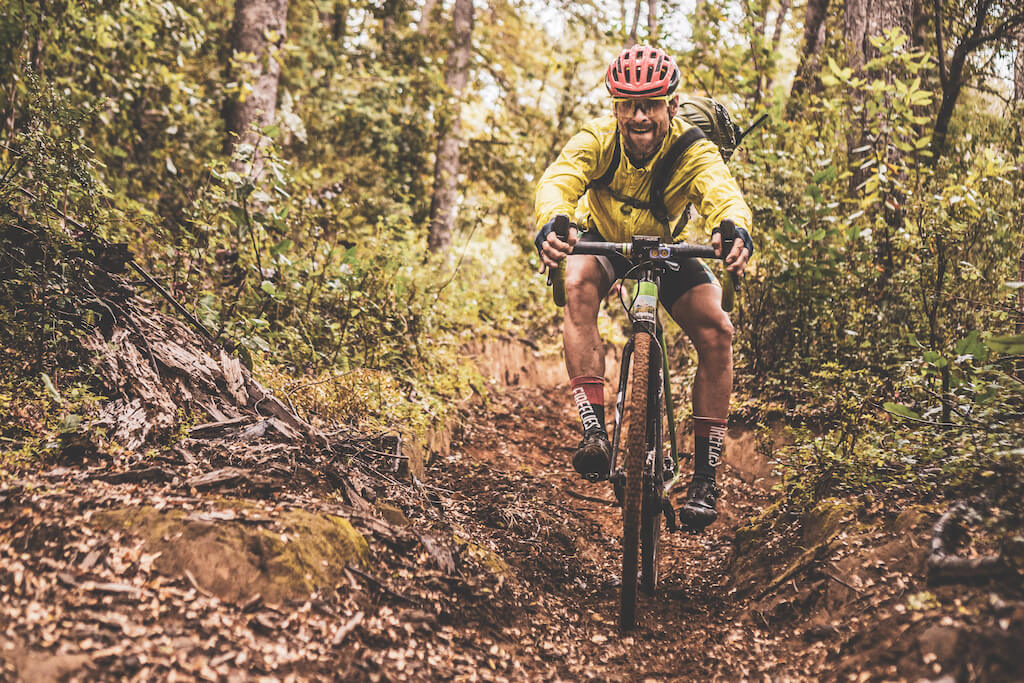
FireFlies mechanic Carbono cruises down one of the typically technical single-track trails
Into the wild
We ride out the next day in our FireFlies Lycra. It’s a superhero red, and I’d feel every bit Clark Kent if it wasn’t for last night’s endless rounds of pizza. Soon we’re straight into the forest, cranking along a riverside roller coaster of low-canopy Patagonian single-track.
The ‘gravel’ bikes we’re riding have a similar geometry to a road bike, there’s no suspension and they’ve got drop handlebars. But the tyres are a thinner version of what you’d get on a mountain bike and they’ve got the knobbly attitude for the rocky and rooty terrain under our wheels. They would turn over nicely, though, if we ever made it onto some groomed dirt roads.
Ignacia draws first blood, taking a neat head over heels into a lemon-scented canela tree. She comes out fragrant, smiling and bleeding. The streaks down her legs match her jersey.
We sweat uphill for six hours, grinding faint foliage-littered trails. Dappled light casts columns of dust between each rider in the forest. Bracken rips at our legs and raulí trees explode with maggots as we deadlift our bikes over their fallen trunks.
“Here comes the calamina,” Dani shouts over her shoulder, as if introducing a delicious entrée, “bet you don’t get this back home!” Supposedly cyclable, calamina are the notorious corrugations you find on Patagonian dirt roads. Stick a saddle on a pneumatic drill. You’ll soon get the idea.
This place is really the edge of the map, though. The riding begins to feel like those glitchy computer games that left you falling through space, or when Truman’s skiff collided with the edge of the set. As we approach the international border, a swarm of disturbed wasps bursts from the undergrowth, stinging a few riders as if to say, “That’s far enough. There’s nothing beyond here for you.”
But we push on. Literally. Hauling our bikes up the mountain, right to the lip of the Andean watershed until an opal lagoon blocks our path and there is nothing left to do but strip off and swim. “Welcome to Argentina,” quips Axel. It’s a long, whooping descent back down the valley and our bike lights have burned low before we uncork the Carménère.
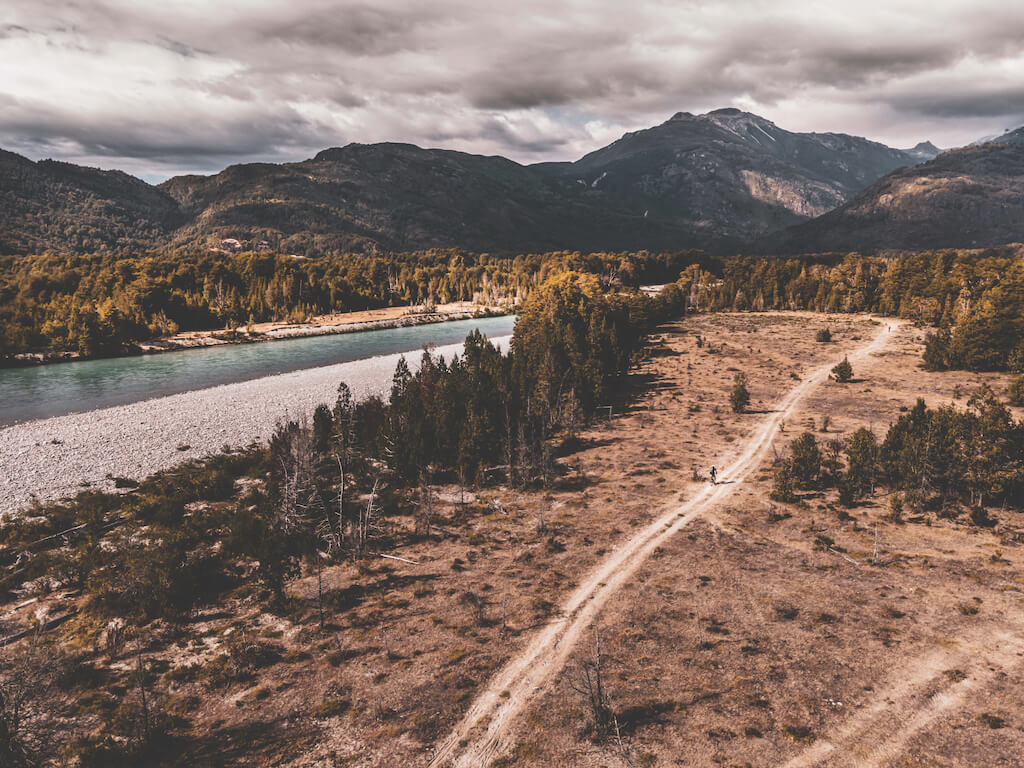
On the day of the storm, thunder clouds rolled in early over the Patagonian Andes, but the riders pushed on
Riding for a fall
The speed boats come for us at dawn on day three. The Patagonian watermen wear boinas – the cowboy’s beret – tipping them against the cold Andean sunrise as they load our bicycles into the hulls. We motor upriver. There’s no jetty to unload; just a rocky outcrop where we land, shouldering the bikes with one arm, pulling at long grass with the other as we fight our way up to a thank-God gravel road.
It soon narrows to a track. Then a trail. Then a traffic jam of oxen at a river crossing. Tethered with a railway sleeper-sized crossbar, these animals are the logging lorries of deepest Patagonia. Our carbon fibre bikes, lost in time, trundle through the Stone Age to the far bank.
We shift gear now and rip across open grassy pastures, bunny-hopping between ruts made by the carts. There’s a long, flowy descent. Then silky single-track. We brush between calafate fruit bushes. Anyone not already bleeding gets a red-berry juicing. Then out of nowhere, beneath a giant indigenous monkey puzzle, we arrive panting and calfate-painted at the remotest police checkpoint on the planet. “Passports please.”
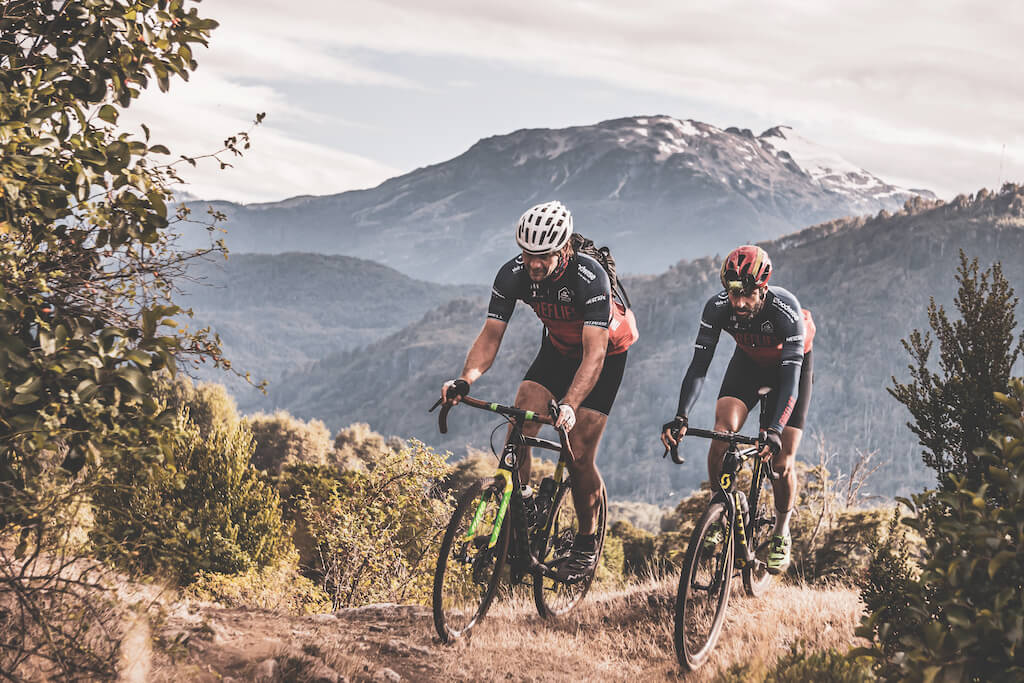
FireFlies Patagonia organisers Axel (left) and Polo (right) recced the route before the event
Weather the storm
The riders sit bandaging themselves on Puelo Libre’s porch. Months seem to have gone by. “I’ve lost all sensation in my palms,” laughs Carola. But it’s unclear how she’s going to hold the handlebars. A persistent drizzle falls as we pedal along the west shore of the swollen Río Puelo. There’s a Patagonian storm brewing up on the Argentinean border. A warning shot of thunder rolls like distant boulders and my jersey sparks with static.
We weave faster between the lenga trees now, ploughing through tributary rivers. Everybody is wet. Everybody is wickedly tired. On the deepest river crossing, Fabricio the medic shoulders his bike, loses his footing and he’s under. The weight of his bike pins him down. Glacier water gives brain freezes like Siberian ice-pops. But there’s no time for a warming fire. So we yoink him out and ride on.
It’s late by the time the men in boinas unsheathe their knives by the fire to serve the crucified local lamb. We’re dry, we have wine, warm food and candlelight. Rain thrashes against the tarpaulin overhead. The Río Puelo roars above it all. It’s been the biggest character on the expedition. But the Mediterráneo Hydroelectric project could be set to change all that.
Building roads through the wilderness and erecting high-voltage pylons where there were once trees, the reactivation of this polemic project would tip the balance for ever in the Cochamó commune: from sustainable adventure tourism, to extractivism.
There’s a lot to digest overnight. I curl up with my bike and listen to the rain. Tomorrow we’ll be flying through this valley. This time the pilot’s threatened to take us the “more exciting” way home.
Words and photography: Matt Maynard / earthriseproductions.com

